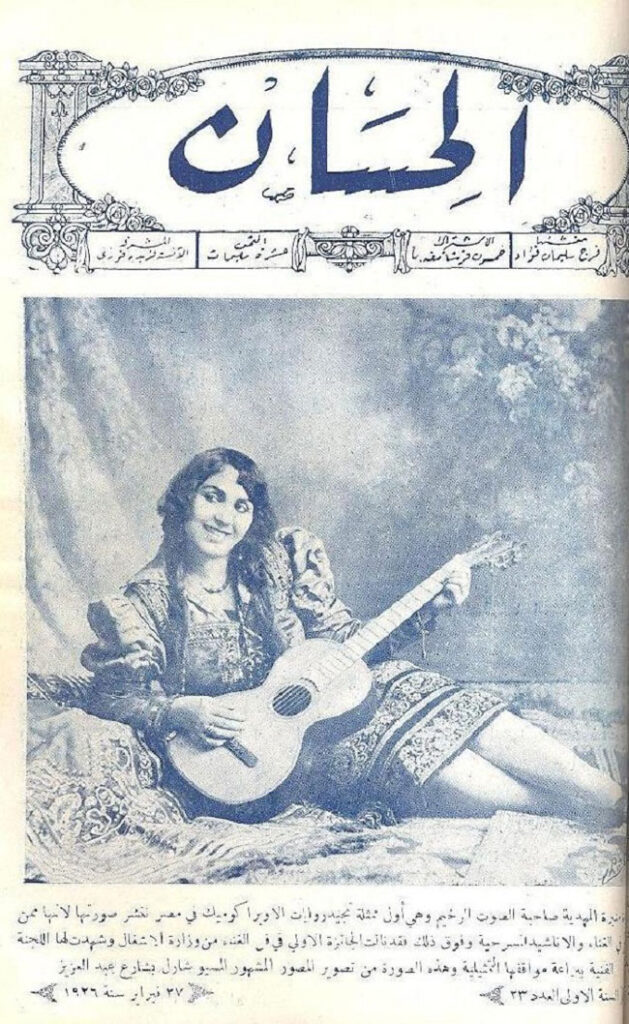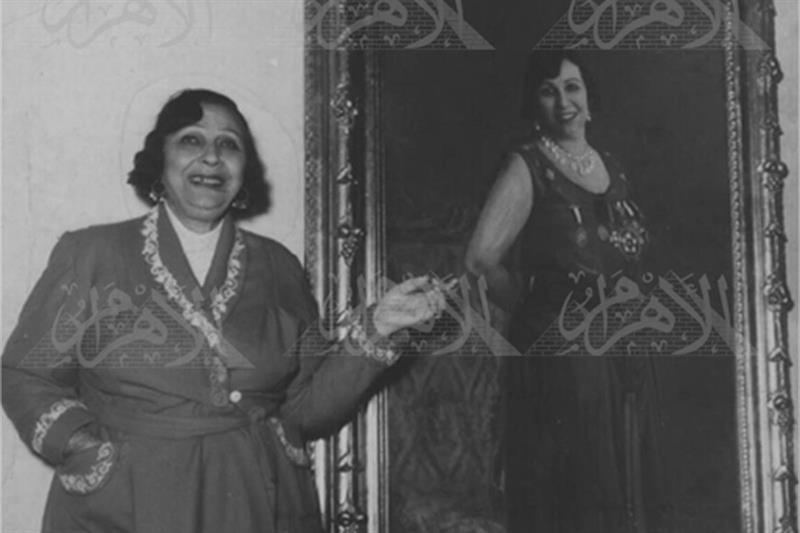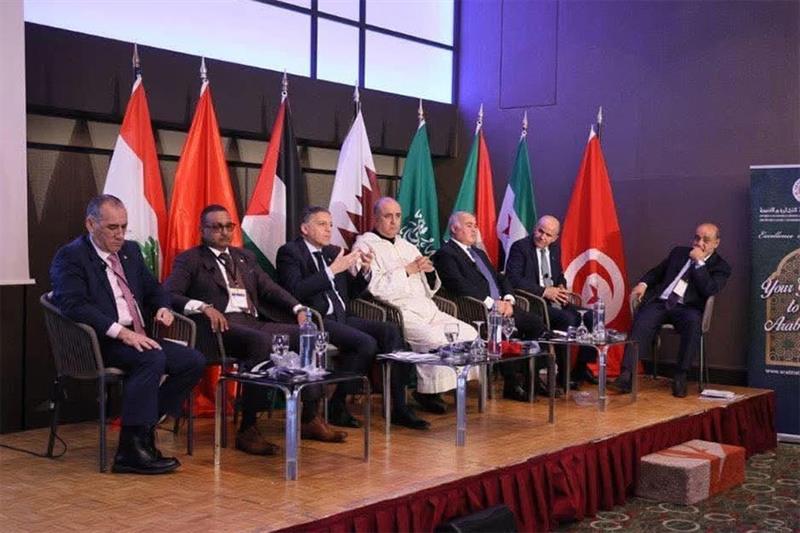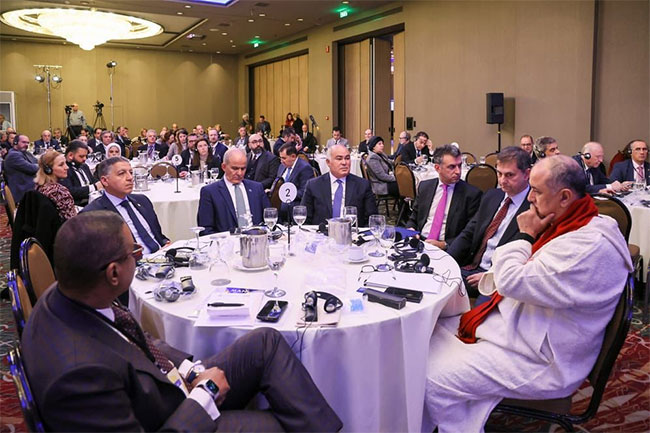‘From Ocean to Gulf: Heritage Music of the Arab World’ is a new series by Ahram Online, in partnership with the AMAR Foundation (Foundation For Arab Music Archiving and Research).
Music is a powerful force for healing and reconnecting us with our roots and shared humanity in a world of numerous challenges.
‘From Ocean to Gulf: Heritage Music of the Arab World’ is a new series by Ahram Online, in partnership with the AMAR Foundation (Foundation For Arab Music Archiving and Research). Focusing on the early years of recording in our region that reflected a modern cosmopolitan repertoire, which coincided with the Renaissance era that flourished in Egypt between the mid-19th century to the 30s of the twentieth century, this initiative aims to introduce our audience to the iconic figures of Arab music whose contributions have enriched our intangible cultural heritage and inspired generations worldwide.
Our series kicks off with Munira Al-Mahdiyya (1885-1965), the Sultana of Tarab Music.

El Set Munira (1885-1965)
In Arab culture, the adjective “Set” is associated with a special high status and great admirable value to any woman. Known to the public as El-Set (The Lady), Munira Al-Mahdiyya stands out as a music icon, a feminist, and a patriotic figure of the early twentieth century. Born in the delta governorate of Zaqâzîq, Egypt, Munira, whose real name was Zakiyya Mansûr Gânim or Zakiyyya Hassan, was known for her powerful, enchanting voice and presence.
She took the Azbakiyya stages by storm at the beginning of the 20th century and had her first records in 1906, making her one of the few women producing commercial recordings before WW1.
‘ālima verses’ ālima
Munîra mastered a learned repertoire and was a versatile ‘ālima, as per the dominant practice in the 19th century. At private concerts, she sang adwar and qasâ ‘id for men and reserved the taqtuqa for women or the public audiences of the theatres. She was also a great mawwāl singer.
The word’ ālima means “the learned,” but it can also refer to a female singer of the wedding repertoire.
By the 20th century, the term‘ālima had another connotation, namely muṭriba, a singer of high-standard repertoire for high-class audiences. At the same time, a‘ālima was a mundane singer whose repertoire consisted exclusively of female wedding songs, mostly ṭaqṭūqa, Egyptianized Aleppan qadd, or Aleppanized Egyptian ṭaqṭūqa.
So, Munīra al-Mahdiyya is a symbol of this transitional period and may be the one who changed the name of dawr-singing ‘ālima to muṭriba. The repertoire recorded by Munīra al-Mahdiyya with Baidaphon, Odeon, and Zonophone is, in part, very similar to what her predecessor, Bahiyya al-Maḥallawiyya, recorded.
“Usṭa Munīra” and her Culture Café
In Ratība al-Ḥifnī’s book titled Munira al-Mahdiyya, she indicates that “after this continuous success –around 1910/12, Munīra rented a café in Azbakiyya which she furnished luxuriously and named “Nuzhat al-Nufūs”, and which soon became famous as the gathering spot of artists, intellectuals and thinkers, in addition to the elite of society, notables and major businessmen, who met there daily. No other café in Egypt was as famous as “Nuzhat al-Nufūs.” The cafe became so famous that the British authorities had to acknowledge its special status and allowed only this café to operate as usual even after they decided to close down all the cafés and gathering places upon the start of WW1 in 1914.
Munira the first
Munīra al-Mahdiyya started her theatre career around 1916, according to various sources. She joined the troupe headed by Salâma Higazi, and after the onset of Higazi’s last illness, she sang the role that had been written for him in “Salâh al-Din al-Ayyûbî”. This is how, disguised as a man, she was the first Egyptian Muslim woman to perform on stage. She was also the first muṭriba to perform on stage without a ḥijāb, or veil. She reached the peak of success in January 1927 with the presentation of “Kilyûbatrâ wa Mârk Antuwân” (Cléopatre and Marc Antoine) with Muhammad Abd al-Wahhâb.
She formed and managed her own company for over ten years and performed new roles written primarily for her, including Arabic adaptations of Tosca, Carmen, and Madame Butterfly. Accordingly, she was one of the first leading female cultural entrepreneurs.
The breeze of freedom in Munîra al Mahdiyya’s theatre
Her company frequently performed patriotic songs that were summarily censored by the British, giving rise to the slogan “Hawa al Hurriya fi masrh Munîra al Mahdiyya” (The breeze of freedom in Munîra al Mahdiyya’s theatre). An independent and famous woman, in 1926, Munîra received a medal from the Ministry of Public Works for services rendered to the revival of Arab singing. Munîra is also the most famous of a multitude of artists of the theatrical scene during the 1920s.
Munira was also known for her patriotism. In 1922, exactly two years after the tomb of Tutankhamun was discovered in the Valley of the Kings in Luxor, Munīra al-Mahdiyya sang a ṭaqṭūqa to the maqām jahārkāh –composed by Al-Qaṣṣabjī– “Mā ygibshi zayyī in laff el-kōn, dah iḥnā abūnā Tut’ankhamūn” (I am like no other for I am the granddaughter of Tutankhamen). The ṭaqṭūqa is politically significant in that it demonstrates that a political, patriotic, and ideological link between Egypt’s ancient and Islamic history had infiltrated the hearts of the people, who considered the ancient Egyptians as their ancestors, thus echoing the Wafd party’s discourse following the 1919 revolution. Furthermore, Munīra sang “Shāl el-ḥamām ḥaṭṭ el-ḥamām” (Doves flew, doves came back) after the first and second exiles of Saad Zaghlūl.
Munīra al-Mahdiyya’s most significant successes as an artist came first during her Baidaphon era in the early 1920s after she returned to Cairo following her long tour in the Levant and after forming a takhet on her first encounter with the theatre. Then, in 1925, she became enormously successful after performing Dāwūd Ḥusnī’s operetta “Al-Ghandūra,” which she adapted for the cinema a decade later. Unfortunately, the movie, a significant record of Munira’s theatrical performance, has been lost. She later performed in many other plays where the patriotic hints in her performance were captured readily by her audience, giving her an aura of patriotic significance closely associated with the still famous commercial slogan “The breeze of freedom”.
Munira opened the door to several performers who followed in her footsteps, including Badiaa Massabni (1892-1974) and alma Bamba Kashar’s nieces, Fathiyya and Ratîba Ahmad, who performed in local operettas. Later in the same decade, ̕Azîza Hilmî and Fâtima Sirrî became singing actresses, but like Munîra, were unfortunately forgotten at the end of the 1930s.
In the mid-1950s, the Egyptian Radio dedicated a two-hour show to Munira, whom they called “Sultana of Tarab.” A short television interview followed this in 1961. Munira passed away in 1965 in the shadow of her previous achievements and glory.
For more about Munira, please check the Munira Podcast series by AMAR.
Part 1: 124 – Munīra al-Mahdiyya 1 « AMAR Foundation for Arab Music Archiving & Research
Part 2: 125 – Munīra al-Mahdiyya 2 « AMAR Foundation for Arab Music Archiving & Research
Part 3: 126 – Munīra al-Mahdiyya 3 « AMAR Foundation for Arab Music Archiving & Research
Part 4: 127 – Munīra al-Mahdiyya 4 « AMAR Foundation for Arab Music Archiving & Research
Part 5: https://www.amar-foundation.org/128-munira-al-mahdiyya-5/
source/content: english.ahram.org.eg (headline edited)
_____________

_______________
ARAB MUSIC

